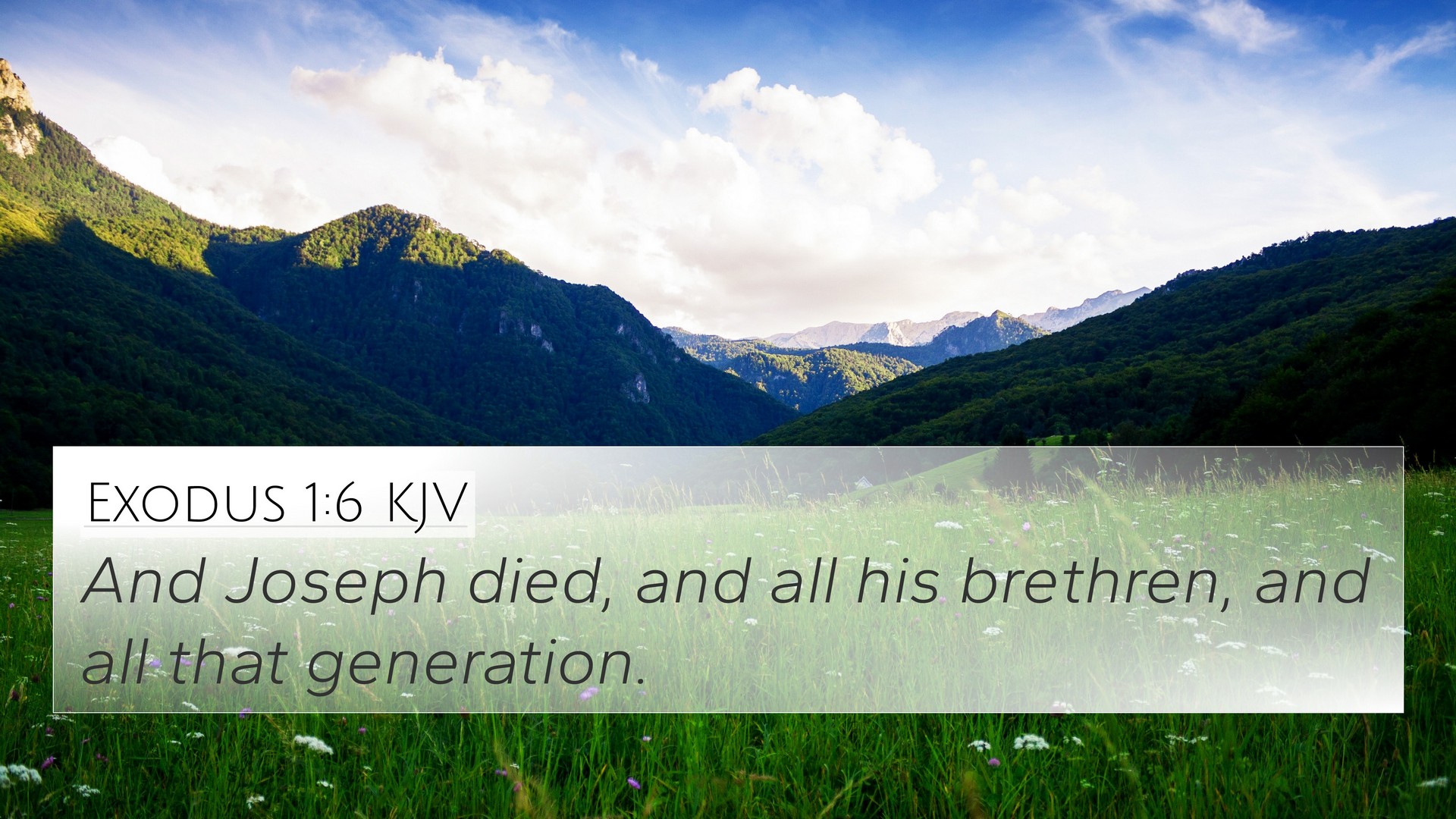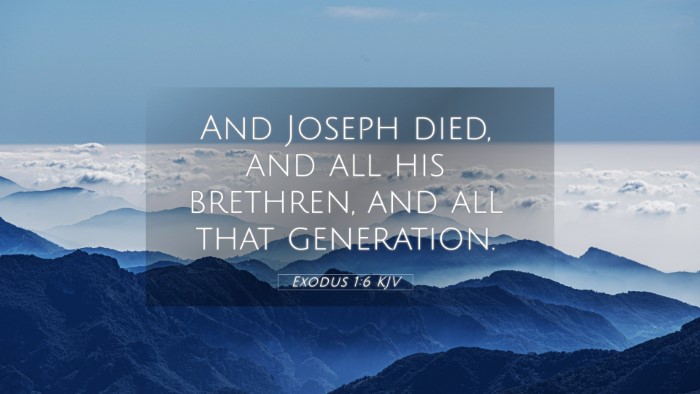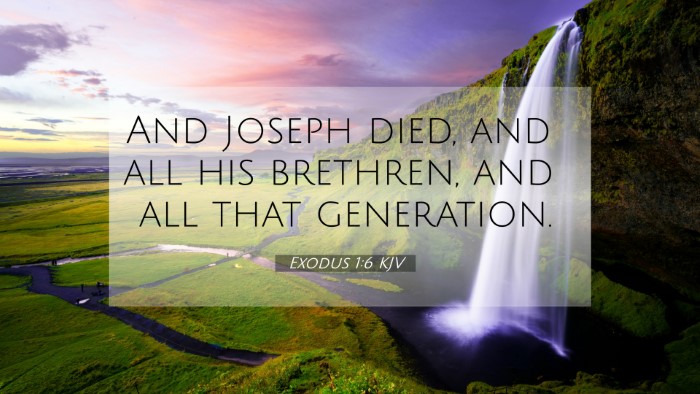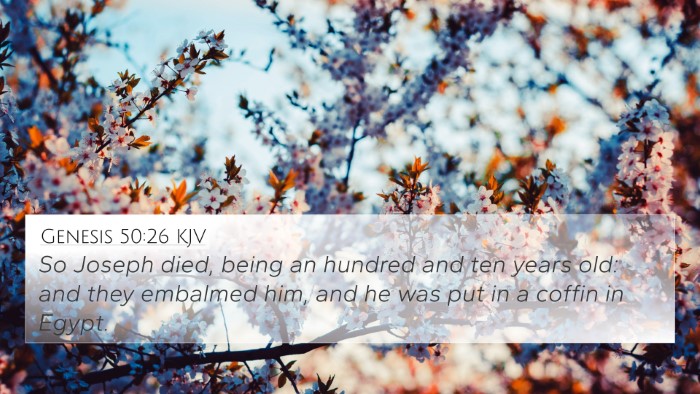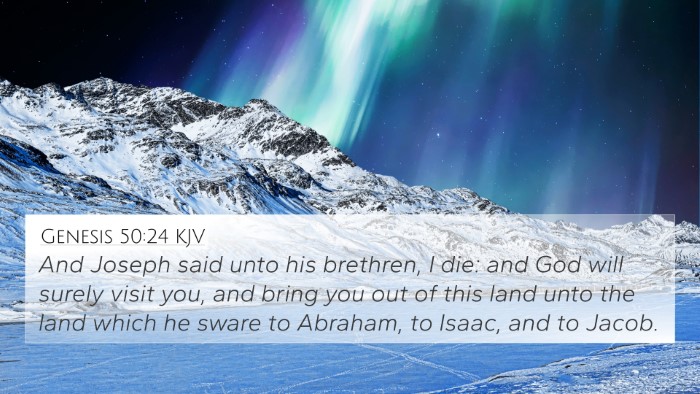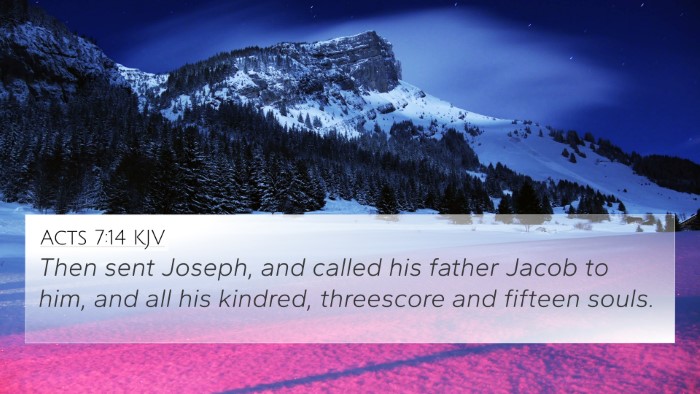Understanding Exodus 1:6
Exodus 1:6 states: "And Joseph died, and all his brethren, and all that generation." This brief yet significant statement marks a pivotal moment in the biblical narrative, illustrating a transition from the era of Joseph and his brothers to a new phase in Israel's history.
Summary of Insights from Public Domain Commentaries
The verse serves as a historical marker indicating the passing of the earlier generation that found favor in Egypt. Its implications are profound, as it sets the stage for the subsequent enslavement of the Israelites.
Matthew Henry's Commentary
Matthew Henry emphasizes that the death of Joseph and his brothers signifies a change in the relations between the Egyptians and the Israelites. The favor that Joseph had earned in Egypt through his wisdom and his role in saving the nation from famine did not extend beyond his generation. Henry notes that the Israelites began to multiply significantly, which eventually led to fear among the Egyptians.
Albert Barnes' Commentary
Albert Barnes points out the importance of this verse in relation to the providence of God. The death of Joseph symbolizes the ending of an era where the Israelites lived peacefully in Egypt. Barnes relates this to God's overarching plan, foreseeing the trials ahead for the people of Israel. He argues that the narrative structure of Exodus highlights God’s continuous guidance and intervention in the affairs of His people.
Adam Clarke's Commentary
Adam Clarke provides a linguistic analysis, stressing the brevity of the phrase. He remarks on how the deaths of Joseph and his brothers signify a transition, marking the end of a blessing period for Israel. Furthermore, Clarke interprets this moment as a prelude to the hardships and oppression the Israelites would soon face under a new Pharaoh who did not know Joseph.
Thematic Connections
This verse connects thematically to other passages in the Bible that discuss the cycles of blessings and trials experienced by the Israelites. Here are some of the connections and cross-references related to Exodus 1:6:
- Genesis 50:22-26 - The final days of Joseph and his instructions regarding his bones signify the long-term hope of Israel's Exodus.
- Exodus 2:23-25 - This passage shows God’s awareness of Israel's suffering after the death of the previous generation.
- Acts 7:17-18 - Stephen recounts this history, emphasizing the fulfillment of God's promise through the trials faced by the Israelites in Egypt.
- Psalm 105:23-25 - A reflection on Israel's time in Egypt and how it transitioned from blessing to oppression.
- Deuteronomy 26:5 - A reminder of Israel’s origins and God's providential care through generations.
- Romans 11:1-2 - Discusses God’s unwavering commitment to His chosen people throughout history.
- Hebrews 11:22 - Joseph’s faith regarding the exodus of the children of Israel is noted here, emphasizing his hope for deliverance.
- Jeremiah 30:7 - References the time of Jacob's trouble, linking to the suffering that would follow Joseph's generation.
- Galatians 3:16-17 - Discusses the covenant made with Abraham, which extends into the story of the Israelites in Egypt.
- Revelation 12:14 - Symbolic references to the suffering of the people of Israel throughout biblical history.
Implications and Lessons
Exodus 1:6 encourages reflection on how generational changes can impact a community. The death of Joseph and his generation serves as a reminder that periods of prosperity can lead to complacency, and subsequent generations must remain vigilant in their faithfulness to God. The ensuing chapter of Israel's history, filled with trials and burdens, compels readers to understand the significance of endurance during challenging times.
Conclusion
In analyzing Exodus 1:6, we uncover layers of meaning that are woven into the broader narrative of the Bible. With insights from Matthew Henry, Albert Barnes, and Adam Clarke, this verse not only stands alone but also connects deeply with other scriptural texts, illustrating the importance of continuity in God's plan for His people. By employing tools for cross-referencing and understanding thematic relationships, one can appreciate the profound implications of this seemingly simple verse as part of a grand divine story.
